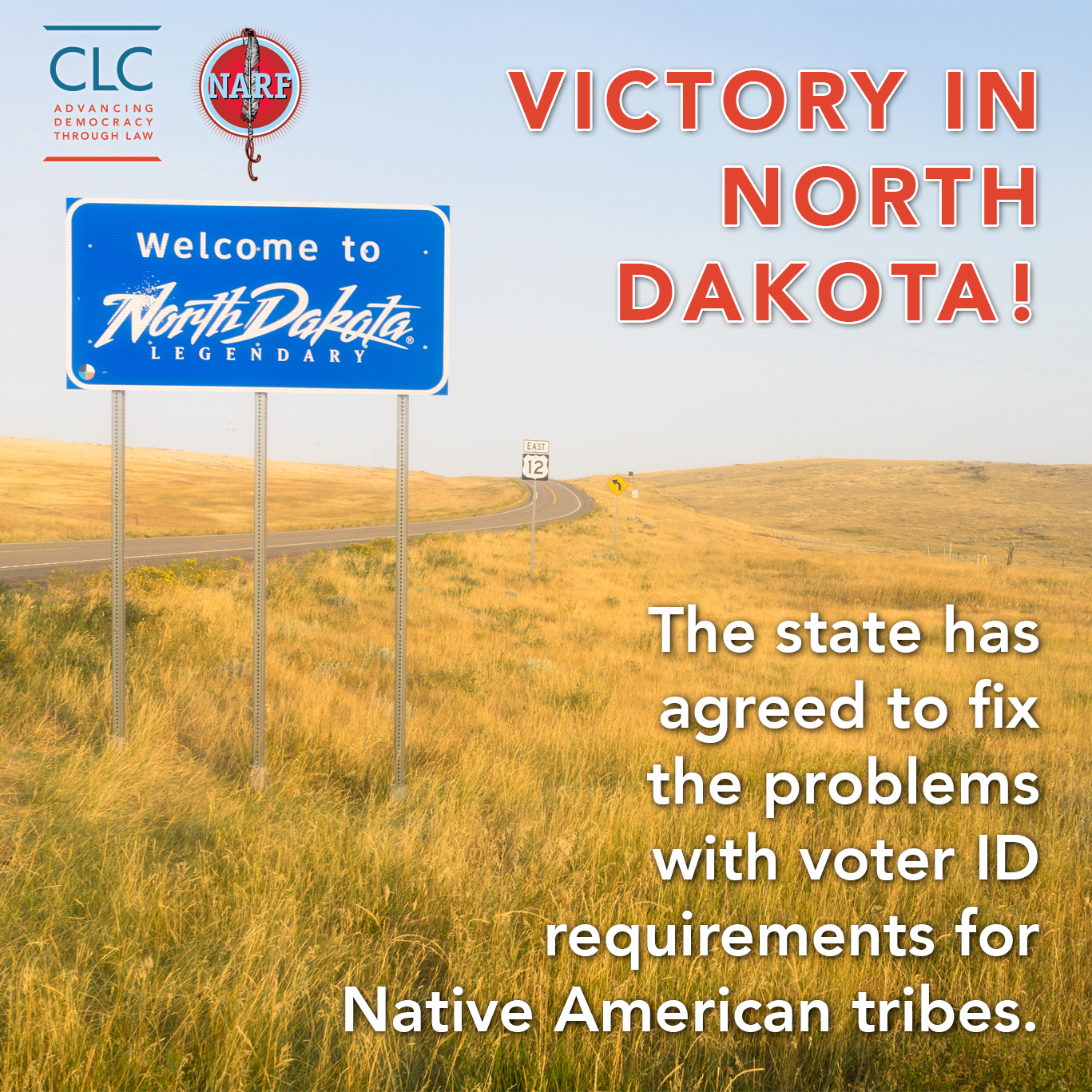
Secretary of State Agrees to Settle Voter ID Lawsuits by Entering Into Consent Decree with North Dakota Tribes

In the wake of the district court’s denial of the State’s motion to dismiss, the Secretary of State has agreed to settle two federal voting rights lawsuits brought by two Native American Tribes and several individual voters over North Dakota’s voter ID law.
The law requires voters to present identification listing their residential street address – a substantial hurdle for many Native Americans living on reservations, because the state has failed to assign residential street addresses to homes on tribal reservations.
In January 2016, eight Native Americans, represented by the Native American Rights Fund (NARF), Tom Dickson, and Rich de Bodo filed suit to block the North Dakota voter ID law, which disenfranchised Native American voters and violated both state and federal constitutions as well as the Voting Rights Act.
On October 30, 2018, NARF, Campaign Legal Center (CLC), Robins Kaplan LLP, and Cohen Milstein Sellers and Toll PLLC filed a separate lawsuit on behalf of the Spirit Lake Tribe and six individual plaintiffs to ensure that eligible Native American voters residing on reservations in North Dakota would be able to cast a ballot in the 2018 midterm elections and in all future elections. The Standing Rock Sioux Tribe, with approximately 5,868 residents of voting-age that could be affected by the law, joined the Spirit Lake case in early 2019.
“This fight has been ongoing for over four years, and we are delighted to come to an agreement that protects native voters,” said Matthew Campbell, NARF Staff Attorney. “It has always been our goal to ensure that every native person in North Dakota has an equal opportunity to vote, and we have achieved that today. We thank the Spirit Lake Nation, Standing Rock Sioux Tribe, and the individual native voters that stood up for the right to vote.”
“We are pleased with the result of the settlement. It was a breakthrough for the state to recognize its responsibility to ensure that Native Americans have access to the identification needed to exercise their voting rights,” said Paul Smith, vice president at CLC. “In order to have a successful 2020 election, the state must follow through with a robust voter and poll worker education campaign to ensure that proper protocols are followed so people aren’t rejected because of the state’s failed addressing system.”
Backstory
Facing a trial date in the Spirit Lake case in May of this year, the Secretary of State announced an emergency rulemaking last week in an attempt to address some of the issues raised by the lawsuit. At an in-person mediation at the North Dakota capitol on February 6, 2020 with representatives from the Spirit Lake Nation and attorneys from CLC and NARF, the Secretary agreed to take additional steps to ensure that eligible Native American voters are not disenfranchised due to the restrictive voter ID law.
Because of the state’s broken addressing system, many Native Americans living on reservations do not have or do not know their residential addresses, and are therefore unable to comply with the North Dakota voter ID law. During the 2018 election, the Spirit Lake Nation and the Standing Rock Sioux tribe expended substantial resources to ensure that their tribal members would have the identification necessary to vote, including by shouldering the burden of identifying and providing residential street addresses for their members.
The unique burdens faced by Native Americans in North Dakota – including a severe housing shortage – mean that tribal members are much more likely to have moved in the intervening time, or to be homeless or precariously housed. As a result, determining members’ residential addresses – and providing them with the documentation necessary to vote – is an ongoing effort that requires substantial resources.
Details of the agreement
In addition to the previously announced rulemaking, which requires the state to recognize tribal IDs and supplemental documentation issued to tribal members, the Secretary has agreed to enter into a binding consent decree, enforced by a federal court order, which will ensure that Native American voters who do not have or do not know their residential street address are able to vote.
The Secretary of State also agreed to work with the Department of Transportation to develop and implement a program with tribal governments to distribute free non-driver photo IDs on every reservation statewide within 30 days of future statewide elections.
In the 2020 election, Native American voters will have the opportunity to mark their residence on a map, a process that is commonly used by voters in other states. The burden will then shift to the state to verify the residential street addresses for these voters, to provide that information to the voter and the tribe, and to ensure those voters’ ballots are counted.
The court-ordered consent decree will include details about what the state must do to educate the public and train poll workers on the new procedures, as well as measures designed to enable the Tribes to ensure the state is complying with its obligations under the agreement.
__
Read the stories of six North Dakota residents that described their challenges accessing the ballot while living on the Spirit Lake Reservation in the days leading up to the 2018 elections.
The post Secretary of State Agrees to Settle Voter ID Lawsuits by Entering Into Consent Decree with North Dakota Tribes appeared first on Native American Rights Fund.
